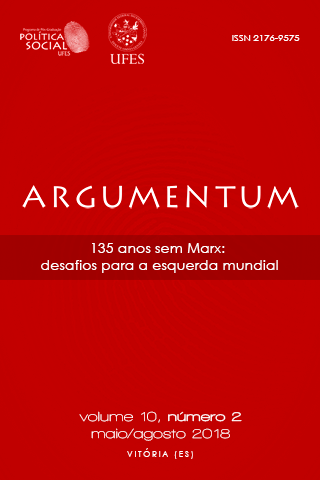A classe nos une, o gênero nos divide: imbricações entre patriarcado e capitalismo
DOI:
https://doi.org/10.18315/argumentum.v10i2.19507Resumo
O presente artigo visa contribuir para a discussão acerca da opressão/exploração sobre as mulheres a partir do método materialista histórico-dialético cunhado por Karl Marx. No ano em que completa 135 anos de sua morte, a teoria crítica formulada por ele e Engels ainda responde com maestria às questões impostas pelo modo de produção capitalista. No que tange à questão das mulheres, não é diferente. Ao mesmo tempo em que situa a opressão/exploração que incide sobre as mulheres a partir de bases materiais e objetivas, com significativo aprofundamento a partir da instituição da propriedade privada, o materialismo histórico nos permite entender a forma dialética pela qual patriarcado e capitalismo se implicam exercendo, ao mesmo tempo, opressões distintas e combinadas, oferecendo a ferramenta necessária para entender que se, em determinada medida, o gênero nos une, a classe nos divide, dando relevo à unidade de classe necessária para superação da sociedade burguesa; por outro lado, a classe nos une, mas o gênero nos divide, trazendo para a cena analítica a opressão patriarcal a qual estão sujeitas as mulheres independente da classe social.
Downloads
Arquivos adicionais
Publicado
Edição
Seção
Licença
Termo de Cessão de Direitos Autorais
Como condição para a submissão, os autores devem concordar com o Termo de Cessão de Direitos Autorais, marcando a caixa de seleção após a leitura das cláusulas.
O(s) autor(es) doravante designado(s) CEDENTE, por meio desta, cede e transfere, de forma gratuita, a propriedade dos direitos autorais relativos à revista Argumentum, do Programa de Pós-graduação em Política Social, Universidade Federal do Espírito Santo - Av. Fernando Ferrari, 514 - Goiabeiras 29075-910, Vitória (Brasil) doravante designada CESSIONÁRIA, nas condições descritas a seguir:
1. O CEDENTE declara que é (são) autor(es) e titular(es) da propriedade dos direitos autorais da OBRA submetida.
2. O CEDENTE declara que a OBRA não infringe direitos autorais e/ou outros direitos de propriedade de terceiros, que a divulgação de imagens (caso as mesmas existam) foi autorizada e que assume integral responsabilidade moral e/ou patrimonial, pelo seu conteúdo, perante terceiros.
3. O CEDENTE cede e transfere todos os direitos autorais relativos à OBRA à CESSIONÁRIA, especialmente os direitos de edição, de publicação, de tradução para outro idioma e de reprodução por qualquer processo ou técnica. A CESSIONÁRIA passa a ser proprietária exclusiva dos direitos referentes à OBRA, sendo vedada qualquer reprodução, total ou parcial, em qualquer outro meio de divulgação, impresso ou eletrônico, sem que haja prévia autorização escrita por parte da CESSIONÁRIA.
4. A cessão é gratuita e, portanto, não haverá qualquer tipo de remuneração pela utilização da OBRA pela CESSIONÁRIA.

